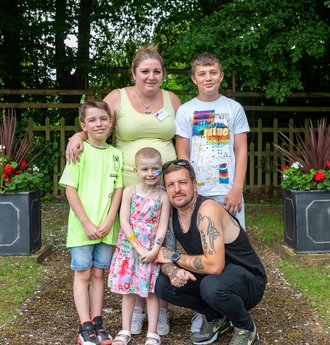Funding award extends clinical trial for children with relapsed or refractory neuroblastoma
Today we are pleased to announce the extension of funding for the MiNivAn trial – a Phase I clinical trial investigating new combination therapies for children with relapsed or refractory high-risk neuroblastoma.
The MiNivAn trial was first funded by Solving Kids’ Cancer UK in 2018, as a new international trial testing a combination of immunotherapy and specialised radio therapy for high-risk neuroblastoma that has recurred or is not responding to standard treatments. The trial, led by Dr. Juliet Gray at the University Hospital Southampton, has been beneficial to several children in the UK and fulfilled its initial recruitment target at the end of 2023.

"MiNivAn is something us as a family have considered throughout Kayla's journey. It's having some really positive results and we're hoping the same for us.
Trials are so so important for these children. There really aren't enough trials out there unfortunately so options can become very limited. We are so very lucky that this is available."
Early analysis of the trial data has shown promising outcomes for the patients that have taken part so far, however with this being an early phase trial in a small population, more data will help researcher to determine exactly how effective this new combination of treatments is. Furthermore, relapsed and refractory high-risk neuroblastoma is very difficult to treat and there are very limited treatment options in the UK. The MiNivAn trial has been an important opportunity for families to access novel approaches to help their child reach remission.
Based on these considerations, Solving Kids’ Cancer UK along with Arms Wide Open, Band of Parents, Joining Against Cancer in Kids, and Solving Kids Cancer US are delighted to be able to fund the extension of this trial, with an additional £295,2077 awarded to the research team.
“New approaches to treating relapsed and refractory neuroblastoma are desperately needed, and extending the MiNivAn trial to strengthen the evidence behind this novel combination is a step towards that goal.
More importantly, families currently facing this hard-to-treat disease must have innovative options available to them. We have seen the positive impact this trial has had already on the neuroblastoma community, and are incredibly pleased that more families will get to see this benefit too.”
Gail Jackson, CEO Solving Kids’ Cancer UK.
The research team at SKC UK has worked closely with Dr. Juliet Gray, Associate Professor in Paediatric Oncology at the Cancer Immunology Centre at the University of Southampton, to ensure that this additional funding creates the best possible impact for children and their families.
“We are delighted to have been able to extend recruitment to the MINivAN trial," said Dr Juliet Gray. "From the patients who have taken part in the trial so far, we have found the treatment to be generally well tolerated and without any unexpected side effects. We have seen some encouraging responses, but the number of patients who have been treated is small. With the additional recruitment we hope we will have a better understanding of how effective the combination of treatments is, and how best to develop it further. There have been lots of families who have been keen for their children to participate in the trial, and we are very pleased that more children will now have the opportunity to do this."
Read more about the MiNivAn trial here: https://www.solvingkidscancer.org.uk/our-research/projects/minivan-phase-i-study-of-i-131-mibg-nivolumab-and-ch1418cho/
